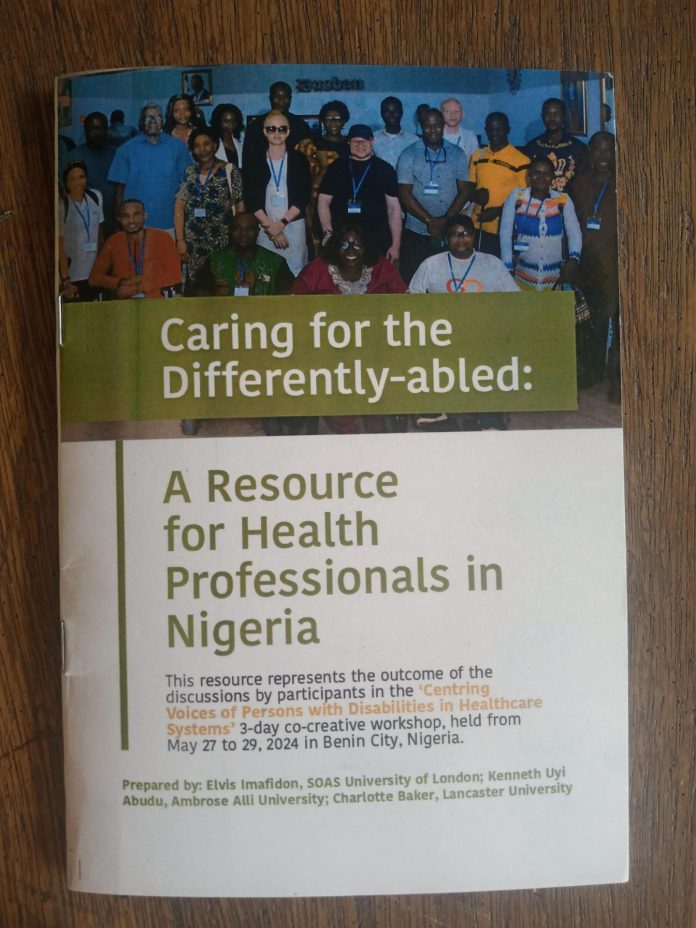Experts, Scholars, and Health Professionals Collaborate on a Game-Changing Resource
Benin City, Nigeria – In a bold and significant step toward improving healthcare access for Persons with Disabilities (PWDs) in Nigeria, a coalition of experts, academics, and healthcare professionals have developed a groundbreaking resource titled Caring for the Differently Abled: A Resource for Health Professionals in Nigeria.
This 15-page document, designed as an essential guide for health practitioners, delves into the often-overlooked challenges faced by PWDs in Nigeria’s healthcare system. The resource was officially launched on Thursday, February 20, 2025, in Edo State, marking a major milestone in the ongoing struggle for disability-inclusive healthcare.
The initiative was spearheaded by Professor Elvis Imafidon, Associate Professor of African Philosophy at SOAS University, UK, and brought to Edo State with funding from the Arts and Humanities Research Council (AHRC), UK. The project brought together cluster heads of the Joint National Association of Persons with Disabilities (JONAPWD) in Edo State, alongside lecturers from SOAS University of London, Ambrose Alli University, and the University of Ibadan, as well as healthcare professionals from various institutions.
This vital resource is freely accessible online at DIA Network.
A Critical Examination of Disability and Healthcare Access
How is disability perceived in Nigerian communities?
What are the common attitudes toward disability in healthcare settings and society at large?
What barriers prevent PWDs from accessing quality healthcare?
How can these challenges be addressed to improve healthcare experiences for PWDs?
These were some of the critical questions that shaped the discussions at the ‘Centring Voices of Persons with Disabilities in Healthcare Systems’ workshop—a three-day co-creative session held in Benin City from May 27 to 29, 2024.
The workshop adopted a relaxed, conversational, and creative approach to explore the lived realities of PWDs within the healthcare system. Participants included persons with disabilities, medical professionals, academics, and disability advocates, creating a unique space where the voices of disabled persons were amplified.
The interactions were insightful and revealing, as PWDs had the opportunity to share personal stories of neglect, discrimination, and systemic barriers, while healthcare professionals, in turn, shared their own challenges in providing care to disabled patients.
Key Issues Uncovered in the Resource
The newly launched resource provides a concise but powerful overview of the pressing issues PWDs face in healthcare settings, and outlines practical solutions for addressing them. The book is divided into sections that include:
- Acknowledgements
- Summary
- Attitudes toward Disability in Healthcare, Community, and Social Media
- Barriers to Healthcare
- Access to Healthcare
- How to Do Better
- Further Resources
One of the most striking revelations in the document is the negative attitude of many healthcare professionals towards PWDs. Participants shared distressing accounts of stigmatization, lack of patience, and neglect by medical practitioners who often lack disability awareness and sensitivity training.
Additionally, the report highlights the physical, financial, and systemic barriers that make it difficult for PWDs to receive adequate medical care. Many healthcare facilities in Nigeria remain inaccessible, with no ramps, no sign language interpreters, and no disability-friendly restrooms.
The book does not merely highlight problems—it provides actionable solutions on how healthcare professionals can create a more inclusive and accessible environment for PWDs.
A Wake-Up Call for the Nigerian Healthcare System
Speaking at the book launch, the Chairman of JONAPWD Edo State emphasized that the resource is a wake-up call for Nigeria’s healthcare system.
“This book was created to address the significant challenges PWDs face in accessing healthcare services. We need to change the negative attitudes of healthcare professionals, remove barriers that hinder access, and ensure that PWDs are not treated as afterthoughts in the healthcare system,” he said.
He further emphasized that the involvement of PWDs in the conversation was a crucial aspect of the project.
“For too long, persons with disabilities have been spoken for, rather than being allowed to speak for themselves. This project gave them the opportunity to engage with healthcare professionals, share their lived experiences, and demand the respect and dignity they deserve,” he added.
An Urgent Need for Change
Nigeria’s healthcare system remains one of the most challenging for PWDs, with many struggling to access even basic medical attention. The lack of disability-inclusive policies, trained professionals, and accessible health facilities continues to worsen health disparities among this vulnerable group.
With the launch of Caring for the Differently Abled, disability advocates are hoping that health institutions, policymakers, and medical professionals will take urgent action to improve healthcare accessibility for PWDs.
A Free, Must-Read Resource for Health Professionals
This groundbreaking resource is intended primarily for health professionals, but it is also valuable for policymakers, researchers, disability rights activists, and community leaders who are passionate about fostering an inclusive society.
With its straightforward language, real-life experiences, and practical solutions, the document serves as an invaluable tool for anyone working towards a more equitable healthcare system in Nigeria.
As the Nigerian government continues to push for universal healthcare coverage, this resource could not have come at a better time. It provides a clear roadmap for reform, ensuring that PWDs are not just accommodated but truly included in the country’s healthcare framework.
Final Thoughts
The unveiling of Caring for the Differently Abled marks a significant step forward in disability advocacy in Nigeria’s healthcare sector. It serves as a powerful reminder that healthcare is a right, not a privilege, and that every Nigerian, regardless of ability, deserves equal access to quality medical services.
For those interested in exploring this game-changing resource, it is available for free download at DIA Network.
With increased awareness, improved training, and policy-driven action, Nigeria can build a healthcare system that truly serves all its citizens, including Persons with Disabilities.


